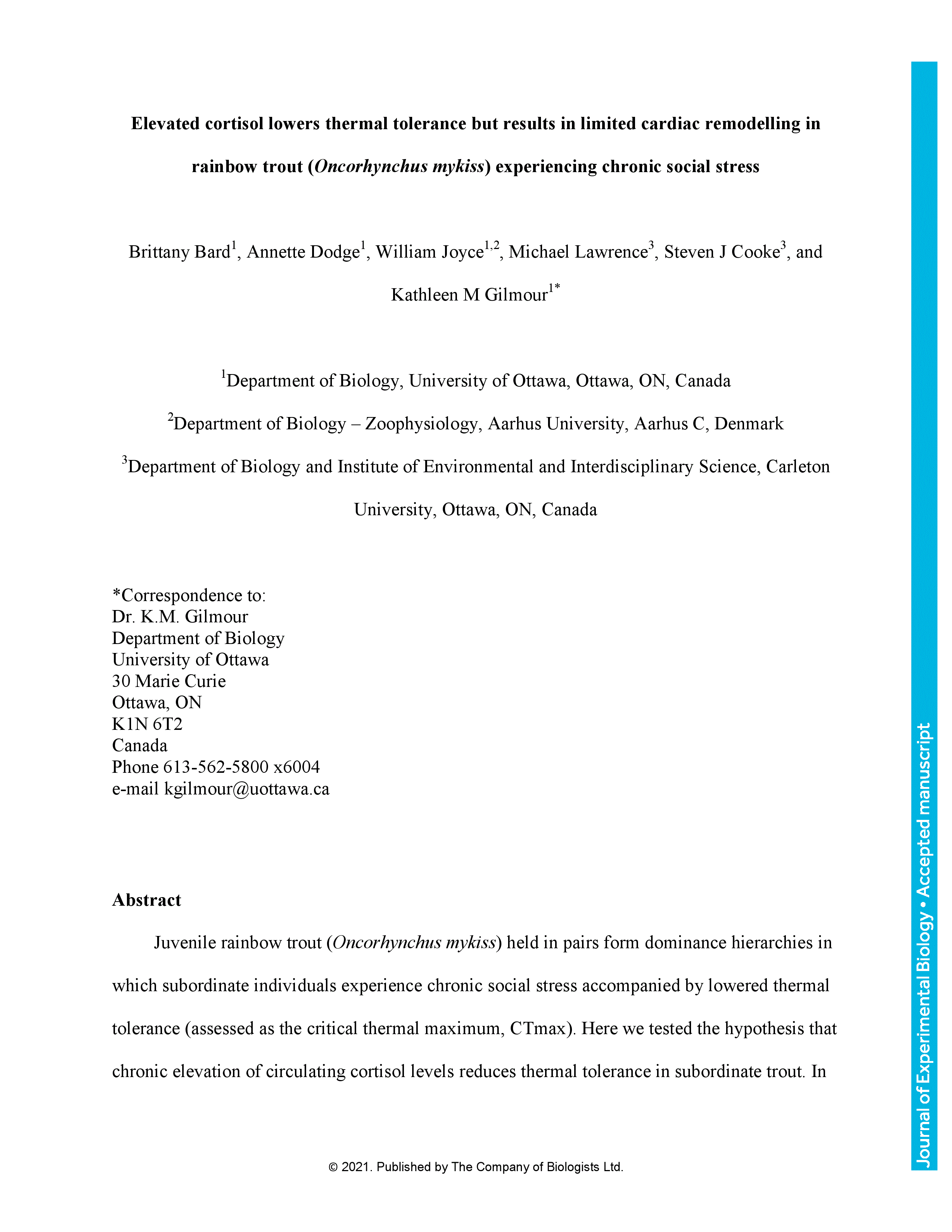Juvenile rainbow trout (Oncorhynchus mykiss) held in pairs form dominance hierarchies in which subordinate individuals experience chronic social stress accompanied by lowered thermal tolerance (assessed as the critical thermal maximum, CTmax). Here we tested the hypothesis that chronic elevation of circulating cortisol levels reduces thermal tolerance in subordinate trout. In support of this hypothesis, subordinate trout that recovered from social stress for 48 h, a period sufficient to return cortisol to normal baseline levels, no longer showed reduced CTmax. Further, thermal tolerance was not restored in subordinates treated with cortisol during recovery from social stress. To explore possible mechanisms underlying the effect of chronic stress on CTmax, we also tested the hypothesis that chronic cortisol elevation induces cardiac remodelling in subordinate trout, as previously reported for cortisol-treated rainbow trout. Ventricle mass and cardiac hypertrophy markers were unaffected by social stress. Picrosirius red staining revealed a trend for lower collagen levels in the ventricles of subordinate relative to dominant trout. However, collagen type I transcript and protein levels, and markers of collagen turnover were unaffected. Indicators of cardiac function, including ventricle passive stiffness and intrinsic heart rate (fH), similarly were unaffected. In vivo fH was also similar between subordinate and dominant fish. Nevertheless, in keeping with their lower CTmax, subordinate fish exhibited cardiac arrhythmia at significantly lower temperatures than dominant fish during CTmax trials. Thus, high baseline cortisol levels in subordinate trout result in lowered thermal tolerance, but 5 d of social stress did not greatly affect cardiac structure and function.
Elevated cortisol lowers thermal tolerance but results in limited cardiac remodelling in rainbow trout (Oncorhynchus mykiss) experiencing chronic social stress
Currently Viewing Accepted Manuscript - Newer Version Available
Brittany Bard, Annette Dodge, William Joyce, Michael Lawrence, Steven J Cooke, Kathleen M Gilmour; Elevated cortisol lowers thermal tolerance but results in limited cardiac remodelling in rainbow trout (Oncorhynchus mykiss) experiencing chronic social stress. J Exp Biol 2021; jeb.238683. doi: https://doi.org/10.1242/jeb.238683
Download citation file:
Advertisement
2023 JEB Outstanding Paper Prize shortlist and winner

The JEB Editors are delighted to announce the shortlisted authors for the 2023 JEB Outstanding Paper Prize. Read the winning paper - Tiny spies: mosquito antennae are sensitive sensors for eavesdropping on frog calls - by Hoover Pantoja-Sanchez and Brian Leavell from Ximena Bernal's lab at Purdue University, USA.
JEB Science Communication Workshop for ECRs

If you’re an early-career researcher interested in science communication and are attending the SEB Annual Conference in Prague this summer, come a day early and join the JEB Editors at a sci comm workshop to learn the key writing skills needed to promote your research to a broad audience beyond your peers (1 July at 14.30-17.30). Places are limited to 24 attendees, and applicants should apply through the SEB registration page by 30 April 2024.
Bridging the gap between controlled conditions and natural habitats in understanding behaviour

Novel technologies enable behavioural experiments with non-model species, in naturalistic habitats and with underexplored behaviours. In their Commentary, Scholz and colleagues discuss how to obtain a deeper understanding of the natural ecology and lifestyle of study animals.
How a macrourid fish remains buoyant at depths it should be unable to reach

Fish with swimbladders should not be capable of descending below 7200m, but when Alan Jamieson and Todd Bond spotted a macrourid fish at 7259m, they knew they had seen something miraculous. Working with Imantes Priede, they reveal that the swimbladder of a 1 kg fish could hold 37.9 g of oxygen, sufficient to offset the weight of the fish's bones, and take 221-440 days to fill, which is plausible because it takes years for the fish to descend to such depths.
ECR Workshop on Positive Peer Review

Are you an ECR looking for tips on how to write concise, astute and useful manuscript reviews? If so, join the JEB Editors at a 2-hour JEB-sponsored Workshop on Positive Peer Review at the Canadian Society of Zoologists annual meeting in Moncton on 9 May 2024 at 13.00-15.00. There are 25 spaces for ECRs and selection is first come, first serve. To sign up, check the ECR Workshop box when you register for the CSZ meeting.



